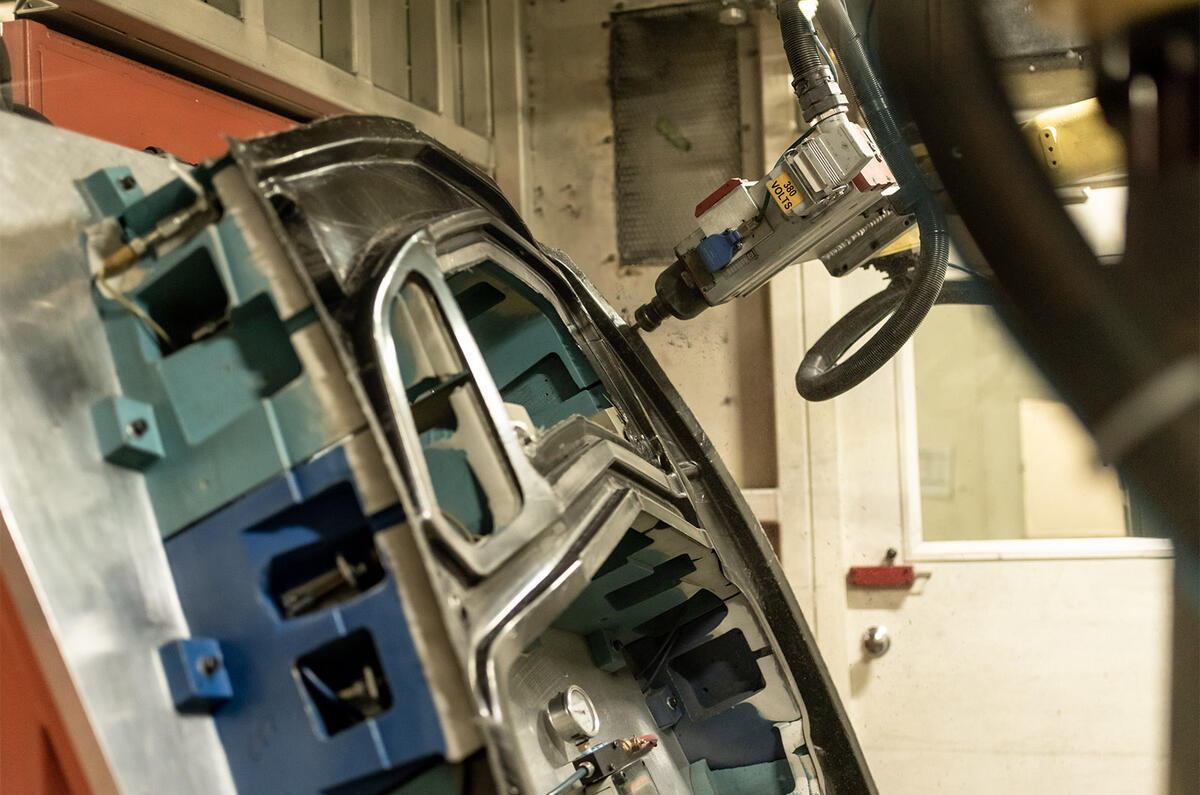A new lightweight carbon-and-composite car body structure could revolutionise the way electric cars are made in the next decade.
Designed by Israeli defence and body panel company Plasan, it’s claimed to offer a weight reduction of up to 45% over steel bodies and 20% over aluminium bodies.
Plasan has presented the new technology to global OEMs and motorsports companies, including some based in the UK, and recently went public with it.
“We’re hopeful that in two to three years, there will be components built using our technology, with a full body following some years later,” chief designer Nir Kahn told Autocar in an exclusive interview.
At the heart of Plasan’s technology are pull-extrusion ‘pultrusion’ carbonfibre beams with carbonfibre filaments distributed continuously through the full length of the tube walls – resulting in very strong, stiff yet light structural members.
Each beam is bonded into composite body panels to make semi-structural bodysides, floor and roof. Then these sub-assemblies are joined with metal ‘nodes’. The nodes are made from two-piece pressed aluminium, intended to speed assembly.
Plasan believes its design is a breakthrough because bodies can be built using existing production line equipment and with the same basic techniques as a conventional steel unibody.
“We really see high production scale possible on cars – this isn’t limited to defence or motorsport applications – with annual production rates in the hundreds of thousands a year feasible,” said Plasan’s boss of composites, Ronen Berger.
Although carbonfibre body technology is relatively expensive, Plasan estimates that the cost to save each kilogramme of weight in an electric car is justifiable at $10 (about £7.70) per kg.
“This makes it more cost effective than other methods of improving efficiency or range of electric cars,” said Kahn. “There’s a virtuous spiral by cutting weight”.
READ MORE
Israeli start up reveals ultra-flexible modular EV platform
The hunt for new car tech: Why Skoda is backing start-ups in Israel
Why Skoda is looking to start-ups for 'simply clever' new ideas





Join the debate
Add your comment
yes and no
Just don't tell the insurance companies. A typical front wing dent could end up costing alot more
Being developed by an Israeli
Marc wrote:
If you have any idea of the medical and technological advances made and used as a result of Nazi and Japanese medical experiments you'd pretty much have to avoid the NHS if you're going to make a that kind of judgement. Medical and scientific advances are made on the back of horrible shit. We were world leaders here in NI due to surgeons having to deal with horrific trauma to the knees of kids who had been kneecapped. Horrible, should never have happened but the NHS were able to bring something good of it for others.
Let's try and leave the politics out of motoring or we may as well read Mike Rutherford.
Jon 1972 wrote:
Quite right, but in this instance it still is happening. And I'll decide whether I wish to leave politics out of motoring.
Politics and military research pervade all our lives..
Like it or lump it, but many cutting edge developments came out of research into killing other people or repairing our own. Carbon fibre, ceramics, lasers,radar, internet etc etc have roots in military research. Does it matter that this is an Israeli company? Did you post your comments on your Chinese made iPhone/Tablet/Computer? I'm no apologist for the Israeli regime but those of you who complain about and boycott Israeli industry need to take a look at the nations they support financially in their purchases
Why can't more cars make use
@ si73
I was thinking just the same the other day. Afterall we use plastic for bumpers and even the bootlid on my car. Renault used to fit plastic wings to their cars, not sure if they still do. It doesn't rust, resists dents and is easy to replace. I can only guess that there strength and cost issues involved. As for this new carbon fibre tech, it sounds good, but how easy is it to recycle?
@will86, I always thought the
But these do imply low ish costs so could be interesting.
si73 wrote:
Because motoring magazines decided years ago that they wanted heavy German cars because of 'the perceived quality'. The public equated plastic with 'crap' and elements of the popular press and competition helped seal the deal. Not helped by sometimes genuine reliability issues although my parents BX that had a plastic boot lid from memory run without a fault.
1930s technology gave us light cars like the 2cv but heavier cars are easier to build and the public likes 'perceived quality'
Potential
I'd be fascinated to know what crash and analysis correlation work that has been performed on this, as it sounds like it has great potential.
Composite tubs have obviously been used in road cars for many years now but they will all have aluminium bolt on structures front and back. Engineers have confidence in predicting performance of aluminium for the complex crash load cases required of a modern car.
This will therefore require extensive testing to prove its worth, but I'm cautiously optimistic.
However, BMW have been here before to some extent with the i3. They developed a relatively expensive body structure to compensate for the low energy density of batteries at the time. Battery energy density then increased significantly rendering the expensive body structure unnecessary.
So the question is which still has the most weight saving potential, the body structure or the batteries? Or will future emissions regs need both anyway.